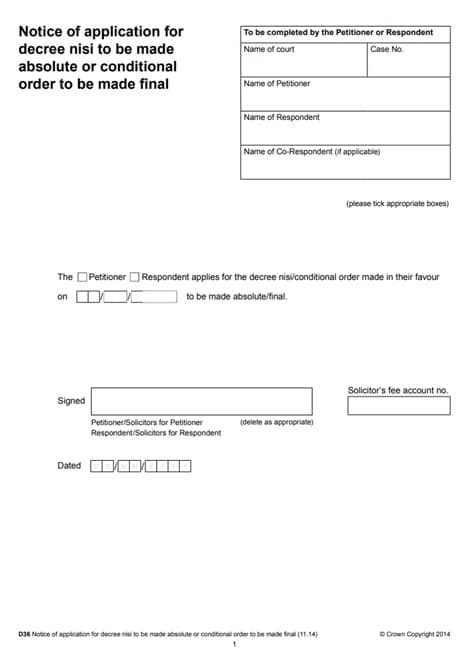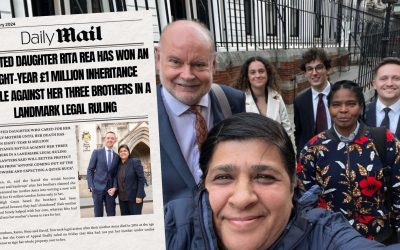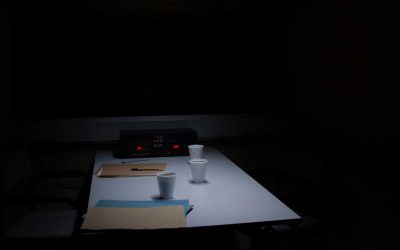In this article

Obtaining a decree absolute is the final stage of getting a divorce. But what exactly is a decree absolute, how do you apply for one, and how long will it take? In this article, our divorce solicitors explain everything you need to know.
If you’re going through a divorce and need help from a solicitor, please visit our divorce law page or call our solicitors directly on 020 3007 5500.
No-fault divorce update
From 6th April 2022, a ‘Decree Absolute’ is now referred to as a ‘Final Order.’ Other than that, they are the same.
For more information about the changes, visit our no-fault divorce blog.
What is a decree absolute?
A decree absolute is a final order which concludes the divorce process. You will receive a decree absolute certificate which legally confirms that your marriage has come to an end, meaning you’re now divorced and free to marry again if you wish.
It’s best if you keep your decree absolute certificate safe, as you may need to prove your marital status in the future.
Furthermore, it’s also a good idea to make a note of your court number. The court number can allow you to apply for a new copy if you lose the original.
What is the difference between a decree absolute and a decree nisi?
A Decree Nisi is the first order issued by the court during the divorce process. It confirms that there is no reason why you should not divorce.
Conversely, a Decree Absolute is the final order issued by the court during the divorce process. It legally ends your marriage, leaving you free to marry someone else.
Importantly...
As of 6th April 2022, a ‘Decree Nisi’ is now known as a ‘Conditional Order.’

Talk to us now. Save costs further down the line.
Save yourself potentially thousands of pounds by seeking advice now. Speak to us today for more information.
Lines open 24/7

How do I apply for a decree absolute?
Before you apply for your decree absolute, you must first ensure you wait at least 43 days (six weeks and one day) following the pronouncement of your decree nisi. If you send an application too soon, you run the risk of the court rejecting your application.
To make an application, you must complete a D36 decree absolute application form. This form will request the court to make a decree nisi final (or absolute.)
If the court is satisfied and finds no reason not to grant the divorce, they will send the decree absolute to you and your former spouse.
What does a decree absolute look like?
The GOV.UK website has a downloadable D36 application form for a decree absolute. This form is shown below:

What do I need to consider when I’m officially divorced?
Once you have received your decree absolute, you’re legally divorced. However, now that you’re divorced, there are several things you must consider, which are:
- Changing your will. It’s common for somebody to want to create a new will to remove their former spouse as a beneficiary of their will.
- Reverting to your maiden name. In some circumstances, someone may want to revert to their maiden name following a divorce. Changing your name after divorce is a relatively straightforward process, as you’ll only need your decree absolute and your marriage certificate.
- Informing your mortgage lender
- Making an application for a new passport and driving licence
- Notifying HM Revenue & Customs
- Closing any joint bank accounts
- Informing your children’s school.
It’s important to plan ahead for these things before going ahead with the decree absolute.
How can Britton and Time Solicitors help?
A divorce solicitor can relieve you of your legal stress and ensure that the divorce process is dealt with correctly. In any divorce case, our solicitors will always require an initial consultation first. In this initial consultation, our solicitors guarantee the following:
- Unlimited time to sit down with our solicitor to discuss the details of your case and ask any questions you may have.
- An upfront time and fee estimate for your case.
- An overview of where you stand from a legal perspective and an outline of your available options.
If you’d like to contact our firm to arrange an initial consultation, please call us on 020 3007 5500. Alternatively, please visit our divorce page if you’re looking for more information on the divorce process.





Good afternoon,
I have a decree nisi dated 1977, saying if nobody objects within 3 months, I will have a complete divorce . I have never had a complete copy of this. It was in Northampton, England.
Now I am told, I need one…… How ?
sincerely
Juliet Anne Rhodes
Hello Juliet, thank you for your question. Our client care team will reach out to discuss booking in a consultation with our family solicitor.
i have already done this.